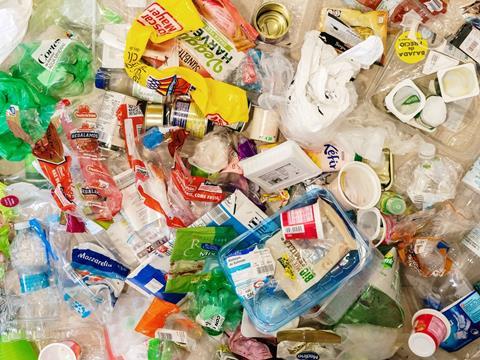
As negotiations for a Global Plastics Treaty continue this week, over 3,000 companies – including Unilever, Johnson & Johnson, and Sumitomo Chemical – have disclosed information regarding their production, use, and disposal of plastics via environmental disclosure platform CDP, while 48 financial institutions have signed an open letter calling for corporate disclosure to become mandatory.
6,473 companies in such sectors as electronics, food and beverage processing, chemicals, and mining – including listed companies with over US$31 trillion in market capitalization value – were invited to disclose their plastics usage through the CPD Water Security questionnaire this year. This involved participants reporting on the ‘most problematic’ plastics utilized across their value chains, including polymers, durable plastics, and plastic packaging.
Plastics mapping, potential environmental impacts, business risks, and targets were covered in the plastics module, with additional questions tailored to companies using particular plastics or activities on total weight, raw material content, and potential for circularity.
Mandatory corporate disclosure has been raised as an addition to the Global Plastics Treaty, instilling an internationally harmonized expectation for nations to monitor and report their contributions to plastic pollution. This is hoped to facilitate more transparency throughout the life cycle of plastics and combat the plastic pollution crisis.
“It is promising to see mandatory corporate plastic disclosure on the negotiating table for the Global Plastics Treaty,” says Pietro Bertazzi, global director for Policy Engagement and External Affairs at CDP. “Disclosure is vital for tracking toward Treaty aims, but it must be made mandatory to be effective. Mandatory disclosure can prevent loopholes and ensure policymakers have access to the insight they need to develop impactful, evidence-based policies that drive private sector action.
“It also creates a level playing field for companies in today’s highly competitive business environment, enabling them to understand their impacts in terms of plastic pollution, the risks they face, the opportunities available to them, and where to take action.
“More than 3,000 companies disclosing their plastic-related information through CDP is a powerful step in the right direction toward a world where action on plastic pollution and waste is business as usual. However, voluntary action alone is not enough. With plastic consumption increasing and greenhouse gas emissions from plastic production expected to double by 2060, companies must be transparent and held to account for their contributions to plastic pollution and waste.
“Now, negotiators must heed the powerful signal sent by over 3,000 companies and leading financial institutions, and ensure provisions on mandatory disclosure is cemented as a key tenet of the Global Plastics Treaty.”
Plastic waste and pollution run the risk of harming companies on a physical, financial, regulatory, legal, and reputational level. Therefore, support for mandatory disclosure is growing in the private sector, and 48 financial institutions with over US$3.5 trillion in assets under management have signed an open letter calling upon governments to implement an ambitious mandatory corporate disclosure mechanism in the Global Plastics Treaty.
Signatories such as Coller Capital and Green Century Funds seek consistent and comparable information on plastics from the companies they finance, with which they can redirect capital flows to reflect the aims of the Treaty and make sure companies measure and manage their plastic footprints.
“There is value in understanding the risks and opportunities associated with companies’ plastic footprints,” says Adam Black, head of ESG & Sustainability at Coller Capital. “We believe that plastic-related disclosure will enhance investment decision-making and make for more informed post-investment engagement. We are proud to support this important initiative from our perspective in private markets.”
CDP has joined forces with the Ellen MacArthur Foundation, The Pew Charitable Trusts, the Minderoo Foundation, and WWF to develop a plastic disclosure mechanism comparable to climate. Full findings from the organization’s first year of plastics disclosure are set to be released next spring.
In a similar development, nearly 7,000 companies are expected to disclose information on their production and use of ‘problematic plastics’ through CDP’s global, publicly available environmental disclosure platform.
Additionally, a coalition of global corporations and NGOs known as the Plastic Footprint Network has developed a unified methodology to measure plastic footprints in the lead-up to INC-3 – a solution hoped to help tackle plastic pollution worldwide.
If you liked this article, you might also enjoy:
The L’Oréal approach to packaging sustainability
What steps is Apple taking to make its packaging more sustainable?
How did Brazil achieve its 100% aluminium can recycling rate – and can it be replicated in the EU?
Experts have their say on the EU’s Packaging and Packaging Waste Directive revisions
Also, if you’re interested in packaging sustainability, you will want to attend our Sustainable Packaging Summit in Amsterdam on 14-15 November. The Summit brings together leaders and pioneers from across the industry to align strategically, learn, network, and create a critical mass to accelerate change. You can learn more by clicking here, and you can buy a ticket to attend here.














No comments yet